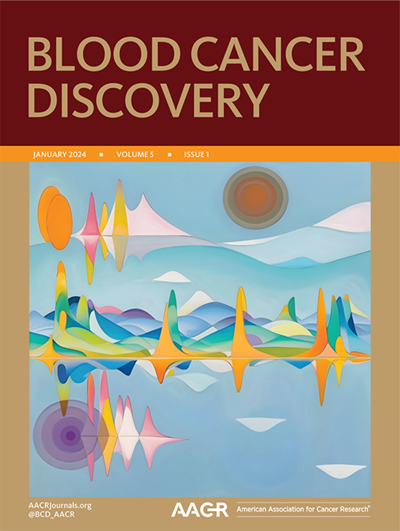Abstract A31: C-MYC Targeting by Degradation: Novel Dual c-MYC/GSPT1 Degrader GT19715 Induces TP53-independent Cell Death in MYC-amplified Acute Myeloid Leukemia and Lymphomas
IF 11.5
Q1 HEMATOLOGY
引用次数: 0
Abstract
The oncoprotein c-MYC, a major regulator of the epigenome and transcriptome, is dysregulated in 70% of all human cancers. MYC is highly expressed in Burkitt lymphoma and TP53 mutant and venetoclax (ven) resistant AML (Sallman, Blood 2021, Nishida, ASH 2021). However, targeting c-Myc or the MYC pathway has not been successful and remains a major unmet clinical need. We developed the first cereblon E3 ligase modulators (CELMoDs) for c-MYC: GT19630 and GT19715 (salt form of GT19630). C-MYC was one of the top decreased proteins in chromatin-enriched proteomics, was pulled down by biotinylated GT19630 in in vitro affinity purification assay and was degraded with IC50 of 0.33 nM in MYC-amplified HL-60 cells. Proteasome inhibitor ixazomib completely blocked c-MYC reduction, suggesting a CRL4CRBN-dependent degradation. Blood cancer cell lines responded to GT19715 greater than other cancer cell lines such as lung, breast and brain tumors in a broad cell line panel, providing rationale to develop the degrader in hematologic malignancies. In agreement with other CELMoDs, proteomic analyses revealed degradation of translation termination factor GSPT1 (G1 to S phase transition proteins 1), an important factor in LSC survival Whereas a selective GSPT1 degrader CC-90009 reduced GSPT1 protein levels but not c-MYC, GT19715 reduced both c-MYC and GSPT1 and exerted a 20x higher cytoreduction than CC-90009 (IC50 of 1.8 nM vs 40.4 nM for GT19715 and CC-90009, respectively) in HL-60 cells. GT19630 degraded c-MYC and GSPT1 and inhibited tumor growth in a xenograft model with HL-60 cells. GT19715 eliminated circulating blasts and prolonged survival in the systemic Burkitt lymphoma model (Daudi). GT19715 significantly reduced human CD45+ AML blasts in peripheral blood, bone marrow (BM) and spleens compared to vehicle controls in vivo in a chemotherapy-resistant AML PDX model. MV4;11 venetoclax resistant (VR) cells demonstrated elevated protein levels of c-MYC and GSPT1 and GT19715 induced 4log10 cytoreduction in BM and prolonged survival of mice with MV4;11 VR cells. Baseline c-Myc protein levels associated with sensitivity to GT19715 in MOLM-13 cells with CRISPR engineered knockout/mutations of TP53 (R2 = 0.86, P = 0.02). GT19715 induced comparable cell death in primary AML samples with wild-type or mutant TP53 (95.4% and 91.7% cytoreduction, P = 0.48 for wild-type and mutant TP53 samples at 64 nM of GT19715, respectively). CD34+ AML cells were more susceptible to GT19715 than CD34- AML cells, suggesting a greater efficacy in AML stem/progenitor than in more mature AML cells. Notably, single cell mass cytometry revealed that CD34+ AML cells had higher c-MYC protein levels than CD34+ normal BM cells and GT19715 reduced c-Myc levels in CD34+ AML but not normal BM cells. GT19715 induced greater cytoreduction in CD34+ AML than in normal BM cells, suggesting a therapeutic window. Conclusions: The novel dual c-MYC/GSPT1 degrader GT19715 exerts TP53 independent preclinical anti-lymphoma and -leukemia efficacy, providing rationale for its clinical development. Citation Format: Yuki Nishida, Darah A Scruggs, Edward Ayoub, Lauren B Ostermann, Tallie Patsilevas, Vivian R Ruvolo, Po Yee Mak, Bing Z. Carter, Steffen Boettcher, Abhishek Maiti, Koji Sasaki, Qianxiang Zhou, Zhaohui Yang, Honghua Yan, Liandong Ma, Michael Andreeff. C-MYC Targeting by Degradation: Novel Dual c-MYC/GSPT1 Degrader GT19715 Induces TP53-independent Cell Death in MYC-amplified Acute Myeloid Leukemia and Lymphomas [abstract]. In: Proceedings of the AACR Special Conference: Acute Myeloid Leukemia and Myelodysplastic Syndrome; 2023 Jan 23-25; Austin, TX. Philadelphia (PA): AACR; Blood Cancer Discov 2023;4(3_Suppl):Abstract nr A31.摘要A31:C-MYC降解靶向:新型C-MYC/GSPT1双降解剂GT19715诱导MYC扩增的急性髓细胞白血病和淋巴瘤中TP53非依赖性细胞死亡
癌蛋白c-MYC是表观基因组和转录组的主要调节因子,在70%的人类癌症中存在失调。MYC在Burkitt淋巴瘤、TP53突变体和venetoclax (ven)耐药AML中高度表达(salman, Blood 2021, Nishida, ASH 2021)。然而,靶向c-Myc或MYC通路尚未成功,仍然是一个未满足的主要临床需求。我们为c-MYC: GT19630和GT19715 (GT19630的盐形式)开发了第一个小脑E3连接酶调节剂(CELMoDs)。C-MYC是染色质富集蛋白组学中减少最多的蛋白之一,在体外亲和纯化实验中被生物素化GT19630拉下,在myc扩增的HL-60细胞中被降解,IC50为0.33 nM。蛋白酶体抑制剂ixazomib完全阻断了c-MYC的还原,表明这是一种依赖crl4crbn的降解。在广泛的细胞系小组中,血癌细胞系对GT19715的反应大于其他肿瘤细胞系,如肺癌、乳腺癌和脑肿瘤,为开发血液恶性肿瘤的降解剂提供了依据。与其他CELMoDs一致,蛋白质组学分析显示翻译终止因子GSPT1 (G1到S相变蛋白1)的降解是LSC存活的一个重要因素。选择性GSPT1降解剂CC-90009降低了GSPT1蛋白水平,但不降低c-MYC, GT19715降低了c-MYC和GSPT1,并且在HL-60细胞中发挥了比CC-90009高20倍的细胞减量(IC50分别为1.8 nM和40.4 nM)。在HL-60细胞异种移植模型中,GT19630可降解c-MYC和GSPT1并抑制肿瘤生长。GT19715在系统性伯基特淋巴瘤模型中消除循环母细胞并延长生存期(Daudi)。在化疗耐药AML PDX模型中,与对照物相比,GT19715显著降低了人外周血、骨髓(BM)和脾脏中的CD45+ AML原细胞。11个venetoclax耐药(VR)细胞显示c-MYC蛋白水平升高,GSPT1和GT19715诱导BM细胞减少4log10,延长MV4;11个VR细胞小鼠的存活时间。CRISPR基因工程敲除/ TP53突变的MOLM-13细胞中,基线c-Myc蛋白水平与GT19715敏感性相关(R2 = 0.86, P = 0.02)。GT19715在具有野生型或突变型TP53的原发性AML样本中诱导的细胞死亡相似(在GT19715的64 nM作用下,野生型和突变型TP53样本的细胞减少率分别为95.4%和91.7%,P = 0.48)。CD34+ AML细胞比CD34- AML细胞更容易受到GT19715的影响,这表明GT19715在AML干细胞/祖细胞中比在更成熟的AML细胞中更有效。值得注意的是,单细胞细胞计数显示,CD34+ AML细胞的c-MYC蛋白水平高于CD34+正常BM细胞,GT19715降低了CD34+ AML细胞的c-MYC水平,而正常BM细胞则没有。GT19715诱导CD34+ AML细胞比正常骨髓细胞更大的细胞减少,提示一个治疗窗口。结论:新型c-MYC/GSPT1双抑制剂GT19715具有独立于TP53的临床前抗淋巴瘤和白血病疗效,为其临床开发提供了依据。引用格式:Yuki Nishida, Darah A Scruggs, Edward Ayoub, Lauren B Ostermann, Tallie Patsilevas, Vivian R Ruvolo, mapo Yee, Bing Z. Carter, Steffen Boettcher, Abhishek Maiti, Koji Sasaki,周前翔,杨朝辉,闫宏华,马连东,Michael Andreeff。通过降解靶向C-MYC:新型双C-MYC /GSPT1降解剂GT19715诱导myc扩增的急性髓性白血病和淋巴瘤中不依赖tp53的细胞死亡[摘要]。摘自:AACR特别会议论文集:急性髓性白血病和骨髓增生异常综合征;2023年1月23-25日;费城(PA): AACR;血癌发现[j]; 2009;4(3 -增刊):摘要/ Abstract
本文章由计算机程序翻译,如有差异,请以英文原文为准。
求助全文
约1分钟内获得全文
求助全文
来源期刊

Blood Cancer Discovery
Multiple-
CiteScore
12.70
自引率
1.80%
发文量
139
期刊介绍:
The journal Blood Cancer Discovery publishes high-quality Research Articles and Briefs that focus on major advances in basic, translational, and clinical research of leukemia, lymphoma, myeloma, and associated diseases. The topics covered include molecular and cellular features of pathogenesis, therapy response and relapse, transcriptional circuits, stem cells, differentiation, microenvironment, metabolism, immunity, mutagenesis, and clonal evolution. These subjects are investigated in both animal disease models and high-dimensional clinical data landscapes.
The journal also welcomes submissions on new pharmacological, biological, and living cell therapies, as well as new diagnostic tools. They are interested in prognostic, diagnostic, and pharmacodynamic biomarkers, and computational and machine learning approaches to personalized medicine. The scope of submissions ranges from preclinical proof of concept to clinical trials and real-world evidence.
Blood Cancer Discovery serves as a forum for diverse ideas that shape future research directions in hematooncology. In addition to Research Articles and Briefs, the journal also publishes Reviews, Perspectives, and Commentaries on topics of broad interest in the field.
 求助内容:
求助内容: 应助结果提醒方式:
应助结果提醒方式:


